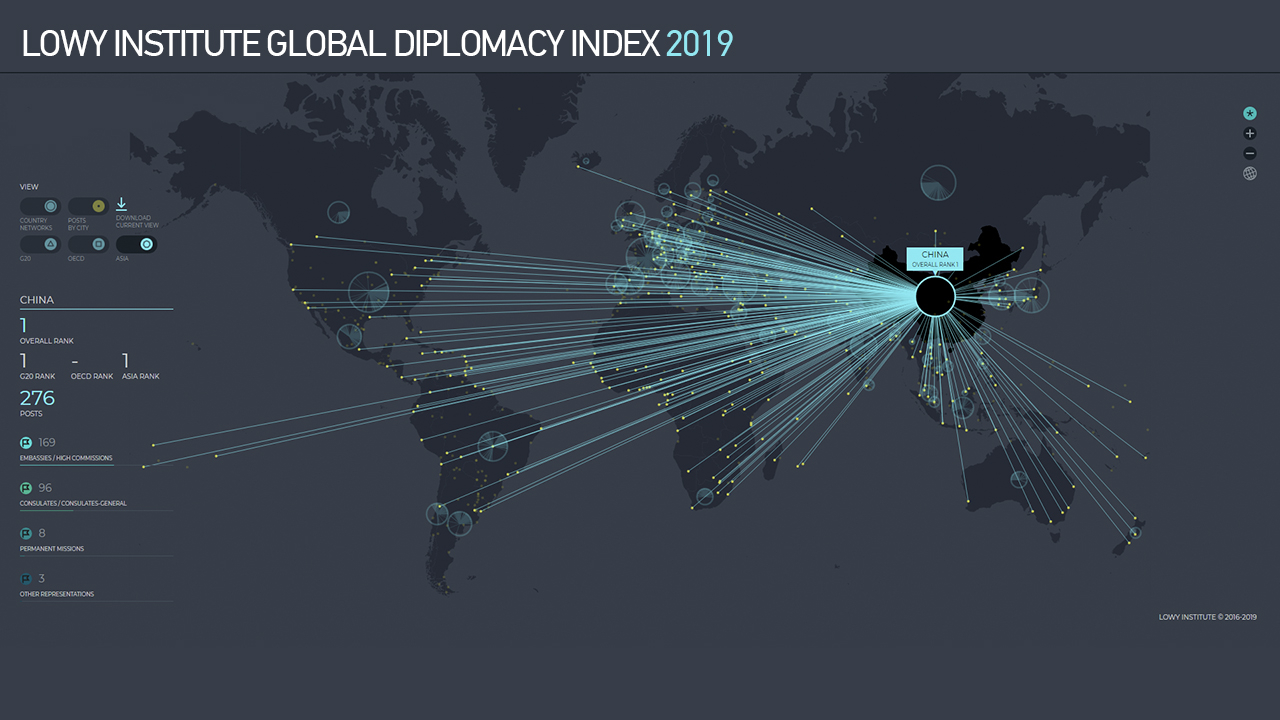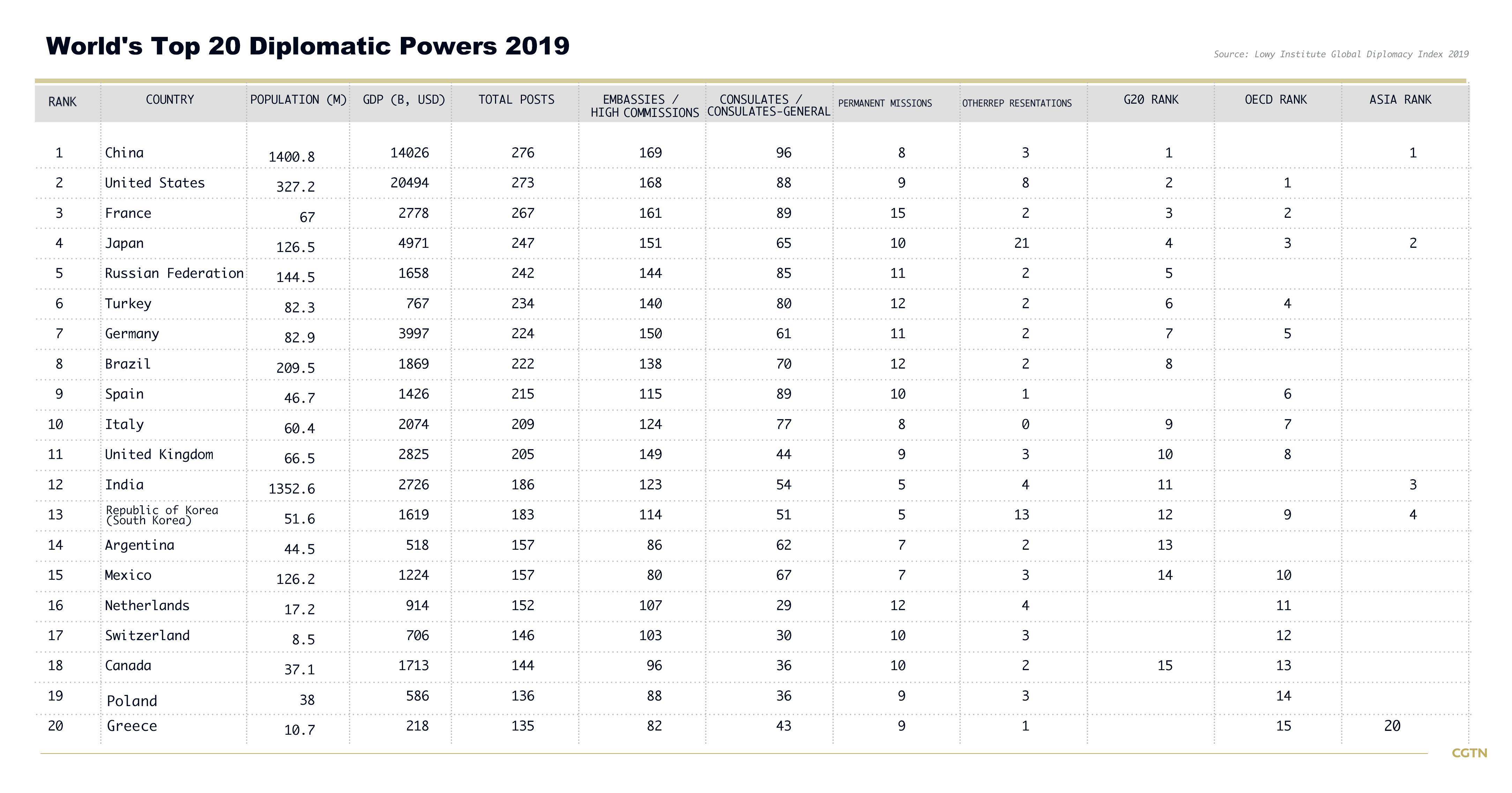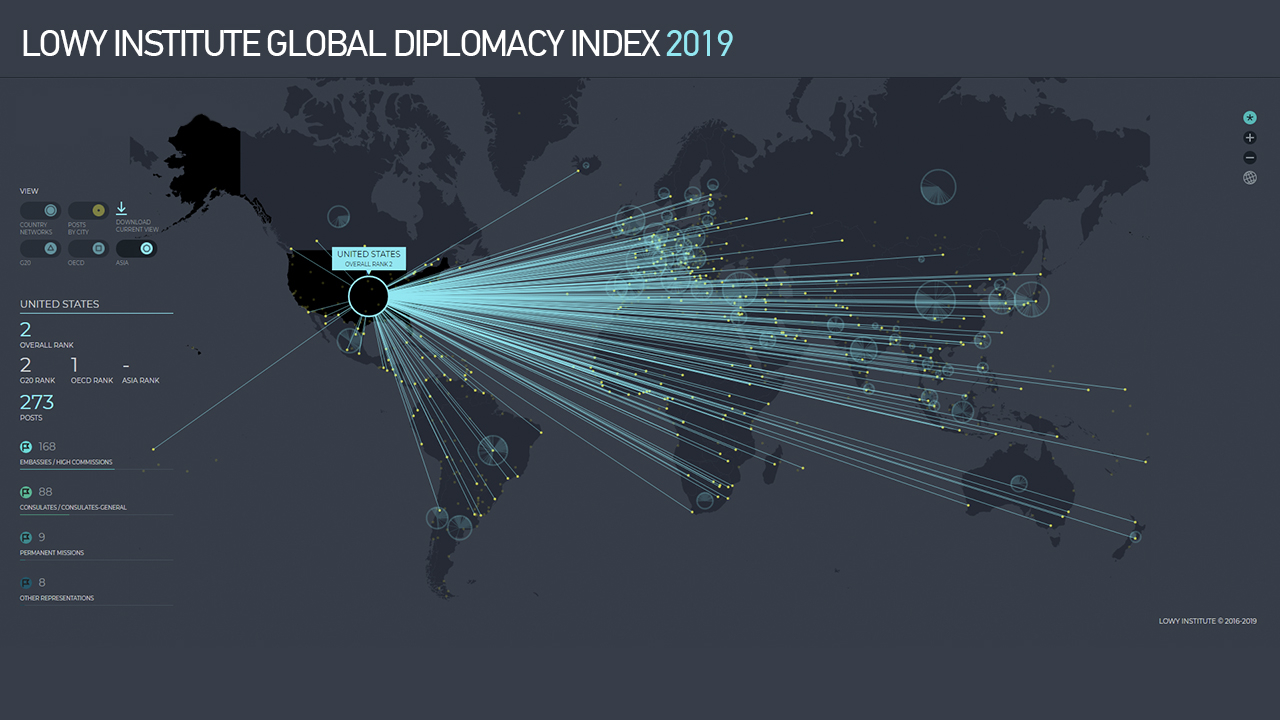
A screenshot of the visualization from Lowy Institute Global Diplomacy Index 2019 showing the reach of China's diplomatic network. /CGTN Photo
A screenshot of the visualization from Lowy Institute Global Diplomacy Index 2019 showing the reach of China's diplomatic network. /CGTN Photo
China this year has overtaken the U.S. as the country with the largest network of diplomatic missions around the world, a study by an Australian think tank revealed, in a clear indication of Beijing's growing international clout and also signs of a geopolitical shift.
According to Sydney-based Lowy Institute's 2019 Global Diplomatic Index published Wednesday, China now has 276 diplomatic posts globally as against the American network of 273. France (267), Japan (247) and Russia (242) make the top five countries with largest diplomatic networks.
"With 276 posts globally, China has for the first time surpassed the United States' network by three posts," stated Boney Bley, Lowy Institute research fellow and lead author of the index that takes stock of how the world's diplomatic networks are expanding and shrinking.
In what could be interpreted as a bellwether of geopolitical transition, the study underlines China's "rapid ascent to the top" while suggesting that the U.S. diplomacy has entered a "period of limbo".

The index showed that in two years, Beijing has grown its network by five diplomatic posts, following the opening of seven new missions and the shutdown of two. "Its ascent to the top spot has been rapid. In 2016, China was in third place behind the US and France, and by 2017 it had moved to second place ahead of France," remarked Bley in her analysis.
At the same time the report also revealed that the U.S.'s diplomatic presence has been marginally eroded since 2017. "Without any new openings in recent years, and after closing the doors of its consulate-general in St Petersburg in 2018 amid rancorous relations with the Kremlin, Washington's total posts are down one post to 273," noted Bley.
"With a hollowed-out State Department – only 73 per cent of key positions are filled, according to the Washington Post's tracker set up for this purpose – and the Trump administration's attempts to cut the State Department and USAID budgets by up to 23 percent, American diplomacy is looking rudderless," she added.

A screenshot of the visualization from Lowy Institute Global Diplomacy Index 2019 showing the reach of U.S.'s diplomatic network. /CGTN Photo
A screenshot of the visualization from Lowy Institute Global Diplomacy Index 2019 showing the reach of U.S.'s diplomatic network. /CGTN Photo
The Taiwan factor
One of the reasons cited in the report for China's upward movement in the past three years in the rankings was Beijing's opening of new diplomatic posts in countries that had previously recognized Taiwan. Incidentally in the same period, Taiwan has seen the biggest drop in diplomatic posts, down from 22 "embassies" in 2016 to 15 in 2019.
Beijing opened new embassies in Burkina Faso, the Dominican Republic, El Salvador, the Gambia, and São Tomé and Príncipe – all of which came to acknowledge Beijing's "One China" policy while breaking "diplomatic" links with Taiwan.
Bley insisted that "… this has directly contributed to China's lead over the U.S.. Following persistent campaigns in targeted countries, Beijing has succeeded in picking off a handful of Taiwan's last remaining diplomatic partners."
The 2019 index charted the size and reach of diplomatic networks of 61 countries and regions by embassies, consulates, permanent missions and other diplomatic posts. The data includes all G20 and OECD (Organisation for Economic Co-operation and Development) countries and most Asian nations and provides rankings for the three categories as well.
Asia rising

Besides the overall rankings, China tops in G20 and Asia categories as well, while the U.S. tops only in the OECD category.
Japan, ranked second in Asia, has improved its lot in the overall index as well. With a total of 247 posts, Japan has moved into fourth place in 2019, overtaking Russia.
"Faced with a shifting power balance in its neighborhood… Japan has been quietly investing in its diplomatic footprint for nearly a decade now. Since 2017, it has added seven new posts in strategically pivotal countries such as Cambodia, the Philippines, the Seychelles, and Vanuatu," Bley pointed out.
"This result follows a pattern of budget increases not only in defense, but also in public diplomacy under the auspices of the foreign ministry," she said.
"But Tokyo has been subtle in communicating these efforts, coupling broader soft-power initiatives such as the recent Rugby World Cup and 2020 Olympics with its growing diplomatic infrastructure, rather than opting for megaphone diplomacy," she noted.
India, with a total of 186 diplomatic posts worldwide, was ranked third in Asia in the 2019 Global Diplomatic Index. The South Asian country also improved its overall ranking from 13 in 2016 and 2017, to 12 in 2019.
Republic of Korea (183), Indonesia (132), Pakistan (117) and Malaysia (107) are among the top Asian diplomatic powers.